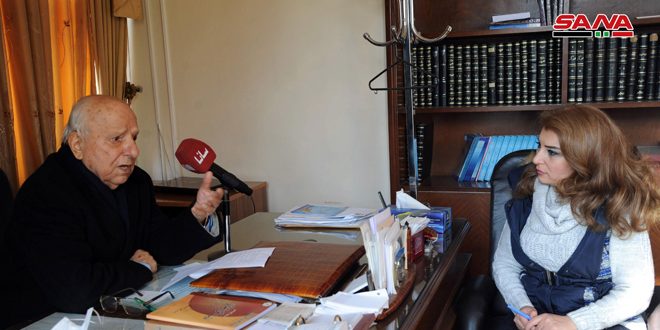Deputy Director of the Arabic Language Academy in Damascus, Dr. Mahmoud Al-Sayyed believes that the “campaigns launched by the West against our language target both our culture and religion, as Arabic is the symbol of Arab-Islamic civilization, and it is an element of unity for Arabs and for all races living on the Arab land, including the Kurds, the Turkmen, the Charax and the Armenians.
In a statement to SANA, Dr. Al-Sayyed highlighted the position of Arabic language as one of the pillars of the cultural diversity of the entire humanity and one of the most used languages in the world.
He explained the role played by Arabic language in Islamic civilization throughout ages, pointing out that, besides Arab scholars, many non-Arab scholars in the Arab-Islamic heritage have enriched Arabic language and contributed to preserving it through their intellectual innovations and contributions to the Arab-Islamic heritage, including Avicenna, Al-Farabi and Al -Kindi.
He said that Arabic was spoken by tribes in the Arabian Peninsula in the form of multiple dialects. Then it took one form upon the revelation of the Holy Quran which brought the Arabs together by unifying their dialects, making Arabic a language of worship for Moslems of all races.
According to Al-Sayyed, all citizens in Islamic countries seek to learn Arabic as it is the language of the Holy Quran. He stressed the need to adhere to this language being a unique factor of unity.
He expressed astonishment over some Arabs’ insistence on speaking foreign languages at international forums and neglecting their traditional language (Fusha) despite the fact that Arabic is one of the six internationally recognized official languages in the world.
On the situation of the Arabic language in Syria, Al-Sayyed affirmed that Syria has adopted this language in all fields of knowledge, noting the issuance of many decrees and laws that provide for protecting and preserving the Arabic language.
He explained the important role played by the Arabic Language Academy in Damascus in maintaining Arabic, affirming that preserving and elevating the position of Arabic is a national duty by Arab societies that must get official and popular support.
Hamda Mustafa

